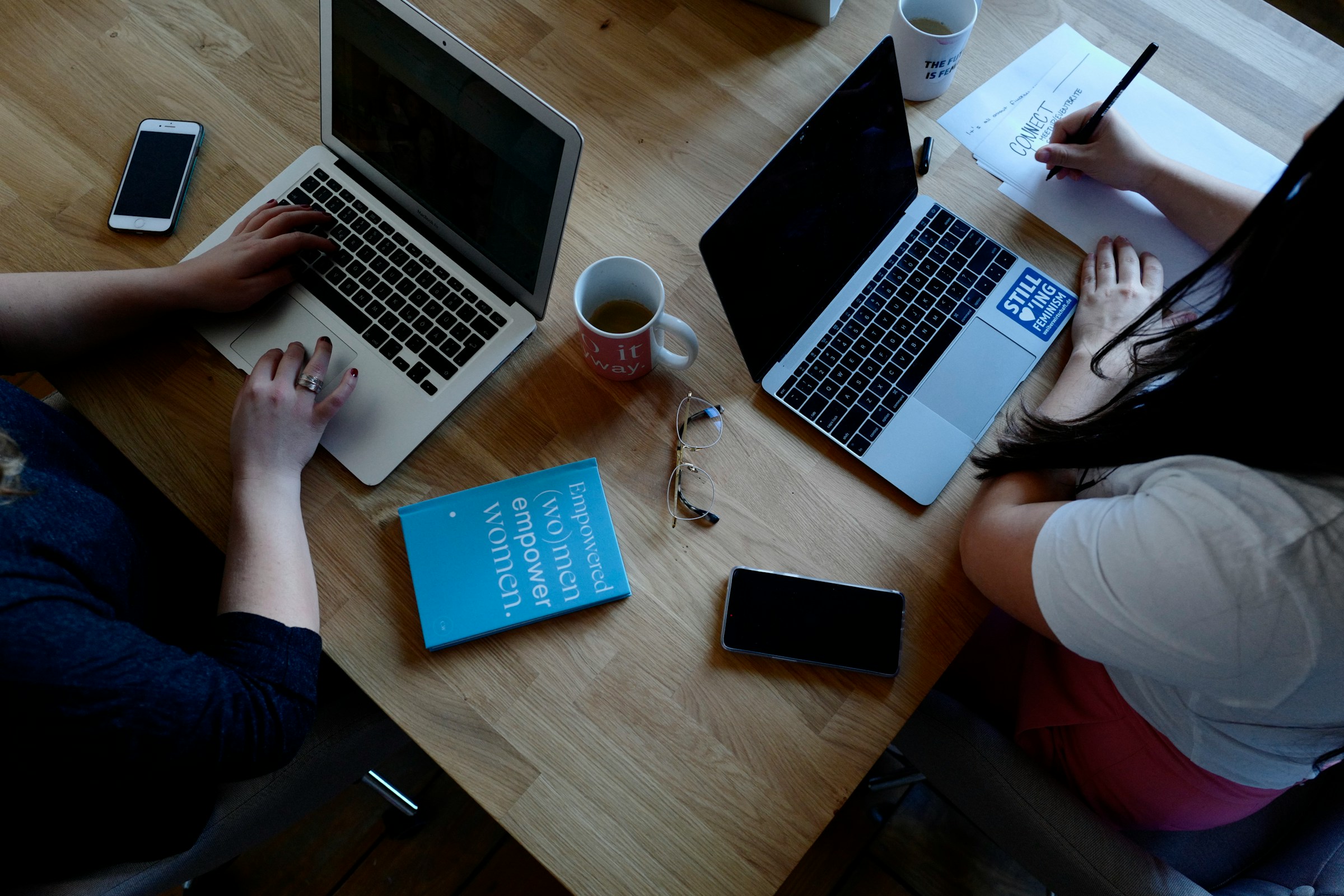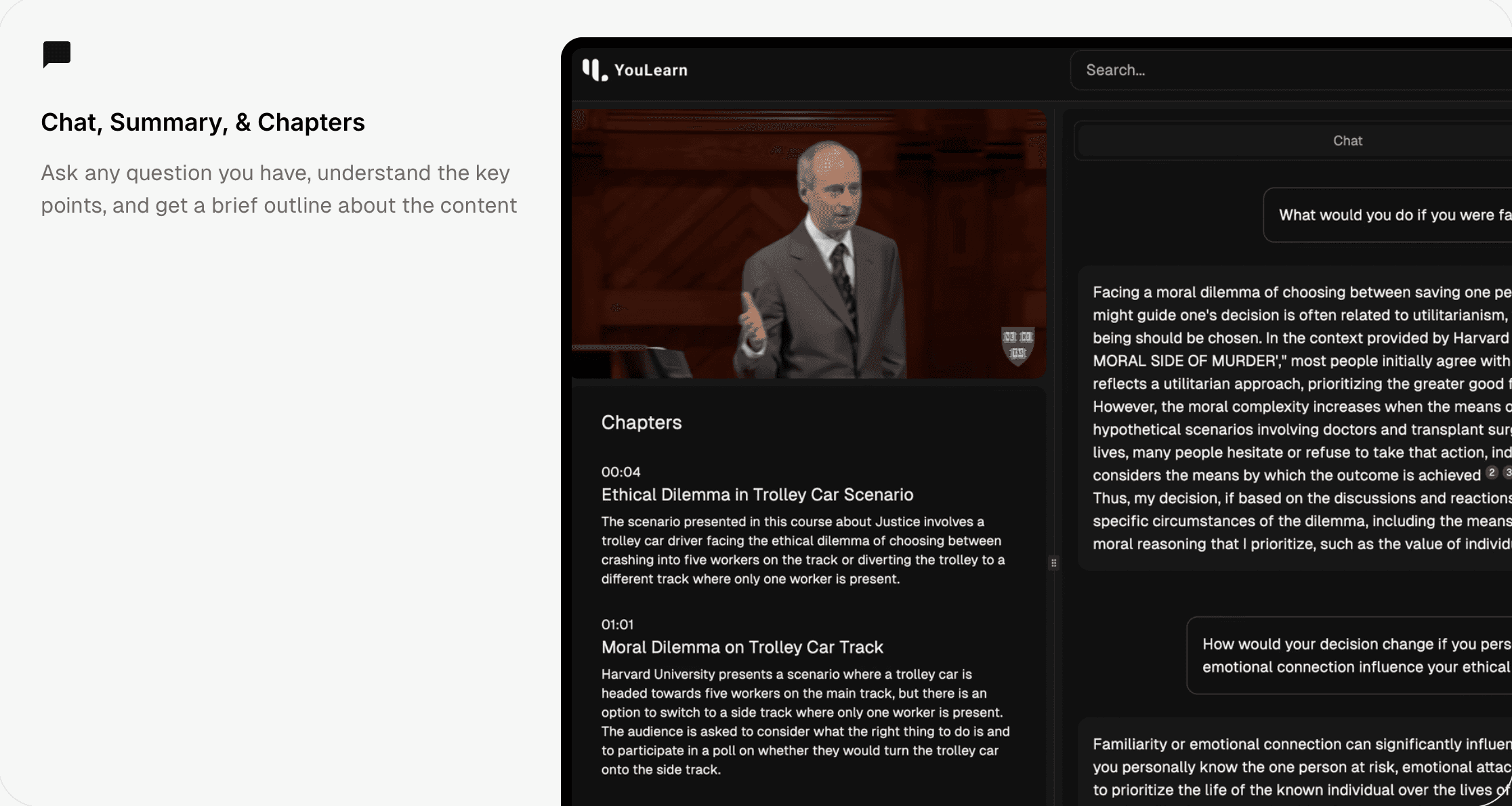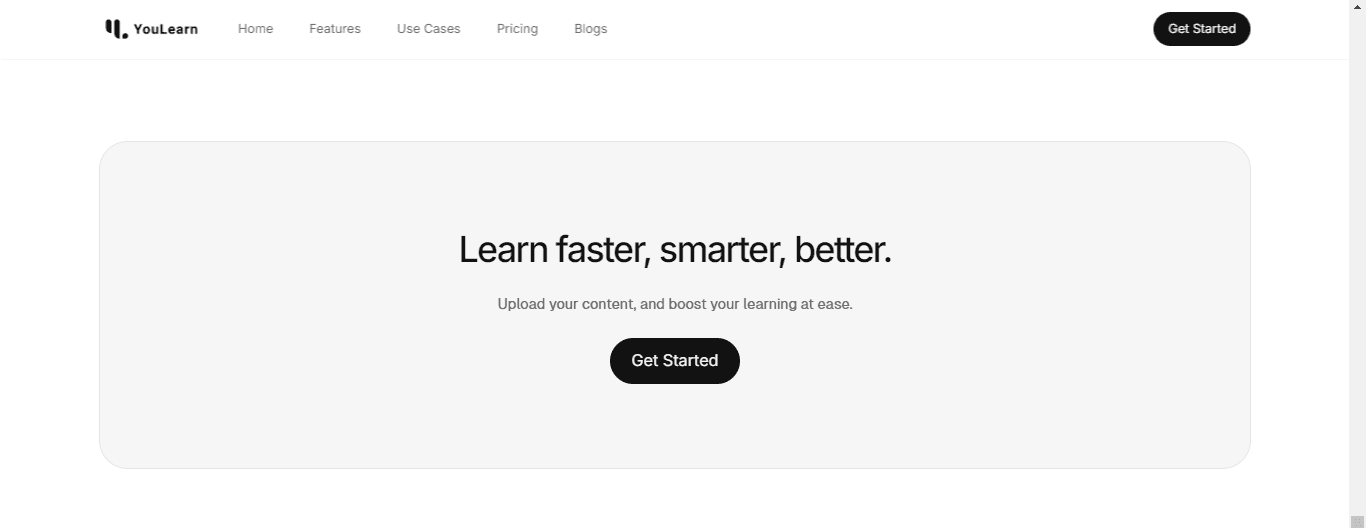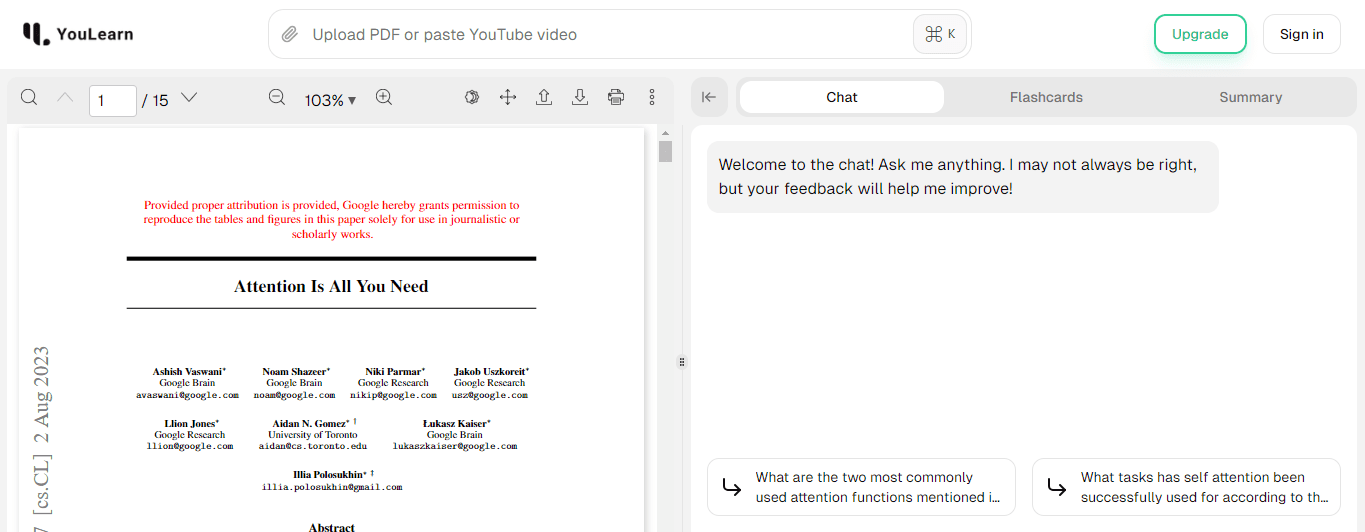30+ Practical Tips On How To Study Better In College
Oct 1, 2024

YouLearn Team
Consider it's the week of finals, and you've barely begun to prepare for your upcoming exams. You need to figure out where to start between the assignments due next week and your social obligations. If this scenario sounds familiar, you're not alone. Any college student will tell you that studying for finals can be an overwhelming experience. But what if you could access personalized learning to help you study better in college?
Beyond alleviating stress, individualized learning can help you determine precisely what you must study to boost your performance. This guide will show you Stay tuned to know how to be a better student in college and introduce you to YouLearn's personal AI tutor, a valuable tool for achieving your academic goals.
YouLearn's personal AI tutor can help you study better in college by providing personalized learning to help you quickly address your specific knowledge gaps. The result? Improved performance and a smoother, less stressful studying experience.
Table of Contents
What Is The Best Study Method For College Students?

Avoid Cramming: An Urgent Message for Students
Research shows that studying right before a test does not improve long-term retention. Instead, this last-minute approach may boost your performance for the upcoming exam. However, that doesn’t mean you’ve truly learned the material. Instead of waiting until the last minute to study, focus on long-term learning.
Make a Study Plan And Stick to It
Creating a study plan with specific goals can help you feel more at ease and give you a roadmap to follow.
Procrastination is a common pitfall for college students, especially during the transition to university life. Students are often used to less intensive workloads in high school, so they may not know how to adjust when they encounter a heavier college course load.
“My biggest piece of advice is don’t cram,” says Schwab. “Set yourself a study schedule ahead of time and stick to it.”
Seek Help When You Are Struggling
You don’t have to struggle through complex material on your own. Many students are not used to seeking help in high school, but getting extra support is expected in college.
“Be proactive about identifying areas where you need assistance and seek out that assistance immediately,” says our guide to pursuing a biology major. “The longer you wait, the more difficult it becomes to catch up.”
There are multiple resources to help you, including your professors, tutors, and classmates. Harvard’s Academic Resource Center offers academic coaching, workshops, peer tutoring, and accountability hours for students to keep them on track.
Use the Buddy System for Studying
Your fellow students are likely experiencing the same struggles as you. Reach out to classmates and form a study group to go over material together, brainstorm, and support each other through challenges.
Having other people to study with means you can explain the material to one another, quiz each other, and build a network you can rely on throughout the rest of the class—and beyond.
Find Your Learning Style for Better Retention
It might take a bit of time (and trial and error!) to figure out what study methods work best for you. There are various ways to test your knowledge beyond simply reviewing your notes or flashcards.
Schwab recommends trying different strategies through the process of metacognition. Metacognition involves thinking about your cognitive processes and can help you figure out what study methods are most effective for you. Schwab suggests practicing the following steps:
Before you read a new chapter or watch a lecture, review what you already know about the topic and what you expect to learn. As you read or listen, take additional notes about new information, such as related topics the material reminds you of or potential connections to other courses. Also, note down questions I have. Afterward, I try to summarize what I’ve learned and seek answers to my remaining questions.
Take Breaks to Clear Your Mind
The brain can only absorb so much information at a time. According to the National Institutes of Health, research has shown that taking breaks between study sessions boosts retention.
Studies have shown that wakeful rest is as essential as practicing a new skill. Rest allows our brains to compress and consolidate memories of what we practiced.
Allow enough time for relaxation and sleep between study sessions so your brain is refreshed and ready to accept new information.
Cultivate a Productive Space for Studying
Where you study can be just as important as how you study. Find a space free of distractions and with all the materials and supplies you need on hand. Eat a snack and have a water bottle close by so you’re properly fueled for your study session.
Reward Yourself for Progress
Studying can be mentally and emotionally exhausting, and keeping your stamina up can be challenging.
Studies have shown that rewarding yourself during work can increase enjoyment and interest in a given task. According to an article for Science Daily, small rewards throughout the process can help keep up motivation rather than saving it all until the end.
Next time you finish a particularly challenging study session, treat yourself to an ice cream or an episode of your favorite show.
Review What You've Learned
Practicing the information you’ve learned is the best way to retain information. Researchers Elizabeth and Robert Bjork have argued that “desirable difficulties” can enhance learning. For example, testing yourself with flashcards is more complex than simply reading a textbook, but it will lead to better long-term learning.
“One common analogy is weightlifting; you have to actually “exercise those muscles” to strengthen your memories ultimately,” adds Schwab.
Set Specific Goals for Each Study Session
Setting specific goals along your studying journey can show how much progress you’ve made. Psychology Today recommends using the SMART method:
Specific
Set specific goals with an actionable plan, such as “I will study every day between 2 and 4 p.m. at the library.” Measurable: Plan to study a certain number of hours or raise my exam score by a certain percentage to give me a quantifiable benchmark. Realistic: It’s essential that your goals be realistic so you don’t get discouraged. For example, if I currently study two hours per week, I’ll increase my time to three or four hours rather than 10. Time-specific: Keep my goals consistent with my academic calendar and my other responsibilities.
How To Study Smart, Not Hard?

1. Supercharge Your Study Sessions with YouLearn AI
YouLearn, your AI tutor, is designed to accelerate your learning from YouTube videos, PDFs, and slides. Our AI chats with you about the content provides quick summaries, and breaks information into digestible chapters. Use YouLearn to master any subject, whether as a college student or a self-learner. Just upload your study material; our AI will transform it into an interactive learning experience. With YouLearn, you’re set to learn more intelligently, not more complicated.

2. Mix It Up
Research shows that different media stimulate different parts of the brain. The more areas of the brain that are activated, the more likely you’ll understand and retain the information. So, to learn a specific topic, you could do the following:
Read the class notes.
Read the textbook.
Watch a Khan Academy video.
Learn from YouLearnAI.
Look up other online resources.
Create a mind map.
Teach someone what you’ve learned.
Do practice problems from a variety of sources. Of course, you won’t be able to do all these things in one sitting. But each time you review the topic, use a different resource or method — you’ll learn faster this way.
3. Study Multiple Subjects Each Day
Studying multiple subjects daily to help you stay focused is more effective than diving deep into one or two subjects. For example, if you’re preparing for math, history, physics, and chemistry exams, studying a bit of each subject every day is better. This approach will help you to learn faster than just by focusing on math on Monday, history on Tuesday, physics on Wednesday, chemistry on Thursday, and so on.
Why? Because you’re likely to confuse similar information if you study a lot of the same subject in one day. So, as a tip to learn faster, spread out your study time for each subject. In so doing, your brain will have more time to consolidate your learning.
4. Review Periodically Instead of Cramming
Periodic review is essential if you want to move information from your short-term memory to your long-term memory. This will help you get better exam grades. As the research shows, periodic review beats cramming hands-down. The optimal review interval varies depending on how long you want to retain the information. But experience tells me that the following review intervals work well:
1st Review
One day, after learning the new information
2nd Review
Three days after the 1st review
3rd Review
Seven days after the 2nd review
4th Review
21 days after the 3rd review
5th Review
30 days after the 4th review
6th review
45 days after the 5th review
7th Review
60 days after the 6th review
5. Sit at the Front of the Class
If you can choose where you sit during class, grab a seat at the front. Studies show that students who sit at the front tend to get higher exam scores. The average scores of students, depending on where they sat in class, are as follows:
Front rows: 80%
Middle rows: 71.6%
Back rows: 68.1%
Sitting at the front will allow you to see the board and hear the teacher more clearly, and your concentration will improve, too.
6. Don’t Multitask
Multitasking makes you less productive, more distracted, and dumber. Practical students focus on just one thing at a time. So don’t try to study while intermittently replying to text messages, watching TV, and checking your Twitter feed. Here are some suggestions for how to study smart by improving your concentration:
Turn off notifications on your phone
Put your phone away or turn it to airplane mode
Log out of all instant messaging programs
Turn off the Internet access on your computer
Use an app like Freedom
Close all of your Internet browser windows that aren’t related to the assignment you’re working on
Clear the clutter from your study area
7. Simplify and Summarize the Information
Use mnemonic devices like acronyms, as these are proven to increase learning efficiency. For example, if you want to memorize the electromagnetic spectrum in order of increasing frequency, you could use this acronym/sentence: Raging Martians Invaded Venus Using X-ray Guns.
(To increase frequency, the electromagnetic spectrum is radio, microwave, infrared, visible, ultraviolet, X-rays, and gamma rays.) Study smart by using mnemonic devices whenever possible. In addition, you could summarize the information into a comparison table, diagram, or mind map. These tools will help you learn the information much faster.
8. Take Notes by Hand
If you want to learn how to study efficiently, write your notes by hand. Scientists recommend this, not just because you’re more likely to give in to online distractions when using your laptop. Even when laptops are used only for note-taking, learning is less effective. Why? Because students who take notes by hand tend to process and reframe the information. In contrast, laptop note-takers write down what the teacher says word-for-word without first processing the information. Students who take notes by hand perform better in tests and exams.
9. Write Down Your Worries
These thoughts run through your head before you take an exam. But if these thoughts run wild, the accompanying anxiety can affect your grades. Here’s the solution. In one experiment, researchers at the University of Chicago discovered that students who wrote about their feelings about an upcoming exam for 10 minutes performed better than students who didn’t.
The researchers say that this technique is especially effective for chronic worriers. To be less anxious, take 10 minutes and write down everything related to the upcoming exam you’re worried about. As a result of this simple exercise, you’ll get better grades.
10. Test Yourself Frequently
Decades of research have shown that self-testing is crucial to improve your academic performance. So don’t just passively read your textbook or your class notes. Study smart by quizzing yourself on the key concepts and equations. The Feynman technique is particularly effective in understanding concepts and memorizing them long-term. As you prepare for a test, do as many practice questions as possible from different sources.
11. Connect What You’re Learning with Something You Already Know
Study faster by connecting new concepts with the knowledge you already have. It takes time and effort to think about how to connect new information to what you already know, but the investment is worth it.
12. Read Key Information Out Loud
Studies have been conducted that demonstrate that reading information out loud helps students to learn faster than reading silently. The reason for this? When you read information out loud, you both see and hear it. On the other hand, when you read information silently, you only see it. Reading every word of every set of notes out loud isn't practical. That would take way too much time.
Related Reading
• How to Pass a Test
• How to Be a Good Student
• Back to School Tips
17 Practical Tips On How To Study Better In College

1. Use Your Personal AI Tutor
YouLearn is your AI tutor, designed to supercharge your learning from YouTube videos, PDFs, and slides. Our AI chats with you about the content provides quick summaries, and breaks information into digestible chapters. Whether you are a college student or a self-learner, we help you grasp material faster and more effectively.
Just upload your content, and our AI transforms it into an interactive learning experience. With YouLearn, you're set to learn more intelligently, not more challenging. Learn anything with ease for free today with YouLearn's personal AI tutor.

2. Stay Organized
First and foremost, make sure you get a college planner. This can be a planner with a creative
design, a plain notebook, a wall calendar, or even a tiny dry-erase calendar for your desk that changes each month. A wall calendar or desk calendar is best for double-checking appointments, events, and due dates, while a notebook planner will be best for planning on the go, wherever you are. This planner will keep you in check when you’re in class or a meeting with your advisor.
If digital works better for you (since you can sync it with just about anything – your computer, phone, tablet), think about setting up an agenda on your mobile device. You can set up reminders for test dates, department events, study times, and assignment due dates. Additionally, you can create a study outline on your device in something like Google Docs, Microsoft Word, or another digital format that works for you.
3. Don't Wing It - Plan!
Create a study plan at the beginning of the semester based on your course syllabus. Ideally, you should study a little daily throughout the week —even just 20 minutes can make a huge difference—so you don’t get crammed and stressed out right before the big exam.
4. Take Good Notes
Studying starts in the classroom. Pay attention and take good notes, so when you’re studying later, you’re just reviewing information (instead of learning it for the first time). Speak with your professor about recording lectures on your phone. A recording can complement your notes so you can re-listen to the information in case there are other details you pick up on later to note. Effective note-taking strategies can directly impact your study habits and are one of the most essential study tips for college.
5. Find a Routine
Getting yourself into a study routine is one of the best ways to ensure that studying becomes a part of your everyday habit. Figure out what time of day works best for you, and make a real effort to dedicate that time to reviewing notes, videos, and other related resources.
Pick times during the week to try out your studying. You can try studying in the morning on one day, the afternoon on another day, and in the evening if that works best for you when there are no distractions at the night's end. Once you’ve decided which time works best for you, try to stick with that time of day every day (or at least three days a week) to get in the habit of studying consistently. You might rearrange your routine due to extracurricular activities, time with friends, and other commitments, but be sure to prioritize your studies and get them done in one way or another.
6. Study with Friends
Encouraging friends to study with you can make everything more fun and productive! Ask your classmates to study with you at a particular time and location. For example, you can ask your biology colleagues to study with you after class for an hour at the school cafe. You can set up your computers at a table and grab snacks and coffee to enjoy the time.
The same goes for studying with your friends. Learning together in person can help you hold each other accountable if you're not in a class with them. When you make plans with friends, you don’t want to be someone who cancels or doesn’t show, right?
7. Ask for Help!
If you don’t understand a concept, ask questions! Stop by your professors’ offices during their office hours, or contact classmates and professors via email. Some classes might even have a Facebook Group to keep students engaged and to create an environment to ask questions outside of class. Either way, your professors will be on your side – nonjudgmental, wanting to help you understand the class.
8. Teach Someone!
Teaching a friend, family member, or your pet, the material is a great way to see how well you know it! When you explain it to someone else, you’ll better grasp which information you already have mastered and which information you should revisit for yourself.
You can create a fun PowerPoint or Google Slides presentation, get creative, and present the information in a way that’s easy for you and your audience to understand. Who knows – you might even use that presentation for your classmates someday!
9. Switch Up Your Study Spots
Studying in the same spot can get tedious, so why not mix it up and get a new perspective? College campuses have many study spots for students—from the library to the campus lawn to local cafes (think back to studying with friends and finding an area to set up for an hour or the day). Take advantage of these study areas, both indoors and outdoors, and give yourself a new view every day!
10. Eliminate Distractions
Studying without distractions is crucial. If you’re studying alone, try to find a quiet space or put headphones in to block out noise from your surroundings. If you’re in an area trying to research and it’s just not working out, relocate. It might be frustrating to pick up and move, but it will be worth it once you’re in a good environment.
Consider turning your phone on silent or vibrate, too—you can always respond to messages after your study session!
11. Don’t Cram
While learning an entire semester’s worth of information in one night may seem like a good idea, it’s not an effective study habit and can cause unnecessary stress. Instead, study some information daily for at least 20 – 30 minutes. You’ll likely remember more later and feel calm and prepared for exam time.
12. Memorize vs. Understand
One of the study tips for college that can make a massive difference in how you approach new information is knowing the difference between memorizing and understanding the material. Memorizing information isn’t learning the information—it’s just helping you learn how to repeat it during a finite time.
For example, if you’re studying for a Spanish exam and memorizing a conjugated verb chart, remembering what the verbs look like in written form will help you remember the information for that exam. However, I might forget the meanings of the verbs and how to use them in a sentence afterward since it’s a particular way of studying. This may catch up with me when I take the next level up of Spanish.
13. Review and Reorganize Your Notes
Whether using a notebook, a laptop, or good old-fashioned flashcards, reviewing each line of your notes helps ensure you hit all the correct information you reviewed in class and might even remind you of a few things you would have missed otherwise. Reviewing notes shortly after class and then again a few days later is good. This allows you to break between edits and return to the information with a fresh perspective.
14. Study Smarter, Not Harder

Occasionally, college professors will tell you the information that will (or won’t) be on an exam—listen to them! They’re sharing this information with you to save you time, so you’re not studying the wrong information for hours, and you can focus on the critical points. If you’re unsure about what to focus on while studying, email your professor to confirm or speak with him or her after class.
15. Use the Reward System
Studying can be draining, so treat yourself for a bit of motivation. Buy a coffee from your favorite coffee shop or get some study snacks from the campus convenience store. You can also reward yourself by taking breaks for walking, reading, or watching TV. Adding in a reward will give you something fun to work towards.
16. Take Breaks
Continuing from the previous point, taking breaks is essential. Breaks give you a boost of productivity, reset, and prevent burnout. It might seem like you need to use all the time you possibly can to study back-to-back, but your brain will start to slow down if you don’t allow it to relax. Taking breaks can help you get the most out of your study time with the least stress.
17. Be Confident About Your Studies
It might be easy to fall into the trap of stressing yourself out while studying, but that will be counterintuitive in the big picture. You can control when and how you study to help prepare you for your exams. After that, you must be confident and try to retain the information. Believing in yourself and trusting that you’ve got this can help you forget about the stress and focus on moving forward.
What Is The Best Time To Study?

Many students must consider the time of day before plowing through their study sessions. Yet numerous studies show that your brain performs better at specific times for studying.
The Best Study Times According to Science
Researchers assert that the brain is most alert and teachable between 10 a.m. and 2 p.m. and 4 p.m. and 10 p.m. (Source: Amber Student). If you want to optimize your attention span and practice deep learning, science advises studying between 4 a.m. and 7 a.m.
This period is best for deep focus and is the ideal time to study in the morning. Numerous studies prove that critical thinking and analytical skills are practical between 2 p.m. and 5 p.m. During this time, your brain can efficiently integrate and process any new information you have acquired. Afternoons are also an excellent time for creative learning.
Your brain can connect what you learned and what you aim to retain more quickly, making you more analytical. In most cases, people are generally active in the afternoons since it falls in the middle of a workday. Therefore, you can use your afternoon study to clarify your queries with your instructors.
13 Mistakes To Avoid As A College Student

1. Don't Ignore the Reading Assignments
Reading assignments are more than just busy work. They prepare you to understand lectures better and help you apply what you have learned. “My biggest mistake was assuming I could get by just by attending lectures,” says international economic relations graduate Velin Dragoev.
“Lectures help you apply material and are not meant to replace the readings.” You may feel you can follow along with lectures only; however, assignments and exams will often directly reference these readings. That means you’ll need to catch up with the work in the long run anyway. “People who don’t realize that will find themselves in trouble during finals!”
2. Don’t Overload Yourself
One of the biggest mistakes college students make is taking on too much, according to Jibran Qazi, business graduate and consultant for My Canada Payday. “I took on way too many classes and extracurricular activities, wound up sleeping two hours a day, and lost my joy for college in the first year,” he says. “Today I see a lot of college students pulling all-nighters every other week to cram for one quiz, exam, or test, and I shake my head.” Instead of burning yourself out, Qazi advises making yourself a sustainable study pattern and keeping to it.
3. Don’t Be Afraid to Explore
So much of college is about exploration! “If I could go back now, I would broaden my range of topics to study to understand my passions fully,” says Danny Browne, director at HARO Links. He suggests starting with courses in broad focus areas to help you see what you most enjoy. “Then, look to drill down your choices later on.” Browne’s experience was in a business program with many potential focus areas. He says it takes some time to determine what works best for you.
4. Find a Quiet Place to Study
Distracting elements like the TV blaring in the background, kids asking you for something every three minutes, and noisy roommates in your study environment can turn a simple project into a marathon of frustration. “Dedicate a time and a place to revise that help you get the most out of your work,” Browne says. He recommends tuning out your atmosphere with binaural beats playlists or other free “focus”-themed audio and visual resources that can help you zone in. Your work, writing, and study efforts will be far more efficient if you minimize distractions.
5. Understand Your Materials
A lot of education involves memorization, but if you want to get the most out of your college program, you must understand a subject's relevance, context, and inner workings—not just the figures, names, and dates. “Of course, you’ll need to know the definitions of commonly used phrases,” says business graduate and author Simon Tam.
“Instead of memorizing the textbook, try to understand how the concepts are actualized in daily life.” Not only is this more useful to you in the long run, but Tam says it will probably yield better test results as well. If you recognize how a concept works or is applied, you’re much less likely to be thrown off by a question or answer worded slightly differently than study materials.
6. Don’t Procrastinate
Many college-level courses give students leeway with how they pace their coursework—and that freedom can sometimes be a trap for students used to the high school routine of almost daily homework. Just because it may be possible to coast and take it relatively easy for long stretches in specific courses doesn’t mean it’s a good idea.
Dragoev says one of the biggest college student mistakes he saw involved saving big projects, assignments, and other time-consuming work for the last week of the course. This approach can lead to an overwhelming to-do list that, even if completed, likely doesn’t help you effectively retain information. “Isn’t the whole point of college to learn and acquire new skills?” Dragoev says.
7. Sleep Is Key to Success
Often, the direct result of procrastination, skipping sleep, and putting in long nights of coursework at the last minute is a recipe for trouble. “Repeat after me: no all-nighters,” says Kate Kandefer, co-founder and CEO at SEOWind. She emphasizes that you are damaging your thinking ability if you try to study or work through the night. While it might feel like getting ahead in the moment, you will likely only set yourself back.
8. Don’t Ignore Your Expenses
Being in a college program doesn’t mean the daily costs of life are put on hold. Even though you may have hopes for a better job or salary after graduation, it’s important to remember the budget you are working with now and be careful with spending. Dragoev says expenses related to life on campus can be a blind spot for students. If you lose track of how often you are eating out as you rush from place to place—or if you’ve moved to a different city for school—research the expenses most likely to add up and do your best to minimize them.
9. Research Scholarships
“Often, students default to whatever is easiest,” Tam says. This often means spending a little time researching ways to make your education more affordable. Even if you can’t get a scholarship through your school, there are many other options for finding scholarships and grants.
“Prioritize applying for scholarships, especially niche programs that focus on a particular passion, unique background or experience,” Tam advises. It can take time and effort, but the opportunities are out there. Not every scholarship is going to be huge. Still, even a handful of smaller awards throughout your education can have a substantial cumulative effect—particularly when considering the cost of compounding interest on student loans.
10. Set a Budget
College students have a lot of new experiences on their plates, and many have never had to focus on their day-to-day finances, which can lead to some substantial issues. Building a basic budget to track income and expenses is one of the easiest ways to address this.
When you know roughly how much money you have coming in or out over a period, you can figure out what you’re spending it on and when to cut back on less essential expenses. “One of the biggest mistakes I’ve seen is students not budgeting daily,” Browne says. He advises checking your budget on at least a weekly basis to stay on track.
11. Don’t Compare Yourself to Others
Comparing yourself to other people is a huge mistake to make in and after college, according to Zach Blenkinsopp, owner of Digital Roofing Innovations. “College is a place to network and make social connections. You’ll meet different people who might be in a better place than you.” When that happens, Blenkinsopp says it’s important not to feel belittled by other peoples’ success. Instead, consider how valuable it is to have such intelligent, well-off, or thriving people in your social circle and treat them as a source of wisdom.
12. Don’t Skip Relationships
You might already have your hands complete with your relationships, but the peers in your program are too good of a resource to leave untapped. “The biggest mistake made when first entered college was prioritizing grades over relationships,” Tam says. He encourages students to think of their fellow students as potential future colleagues. Your paths might not cross long after graduating, but leaving a good impression could help you get hired by a future employer or business partner.
13. Don’t Be Afraid to Talk to Your Professors
Your professors are busy, and maybe you aren’t the kind of person who likes to ask for help. But college students who cultivate connections with their instructors can find an incredible source of support. “The biggest ingredient for my success was my relationships with a few key professors,” says Travis Vaughan, CEO of Cancun Tourbase.
He points out that professors typically love seeing students who are energetic, curious, and invested in their teaching. “Most will go out of their way to hook you up with valuable resources, important introductions, and even great business connections years after you have left the university.”
Related Reading
• Tips for School
• How to Do Good in School
• College Study Tips
• Best Study Method
• Study Strategies for High School Students
• Active Study Methods
Learn Anything With Ease for Free Today with YouLearn's Personal AI Tutor

YouLearn is an interactive AI that helps you learn from YouTube videos, PDFs, and slides. Just upload your content and let our AI transform it into an interactive learning experience. YouLearn’s AI will chat with you about the content, provide quick summaries, and break information into digestible chapters. With YouLearn, you can grasp material faster and more effectively.
Related Reading
• High School Tips
• High School Study Skills
• How to Study by Yourself
• How to Pass School

